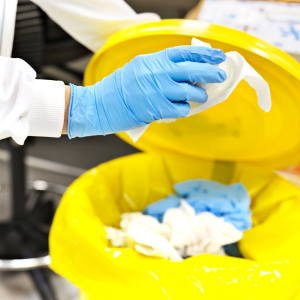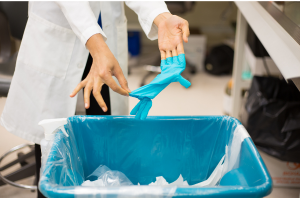Are Latex Gloves Biodegradable? The Truth About Eco Latex Gloves for NZ Businesses
As sustainability becomes a priority for businesses across New Zealand, many are questioning whether common disposable items—like latex gloves—are environmentally friendly. If you're wondering “Are latex gloves biodegradable?” or “Can latex gloves be eco-friendly?”, you're not alone.
This article explores the biodegradability of latex gloves, the role of additives, what "compostable" really means, and how NZ businesses can make informed, sustainable glove choices without compromising hygiene or performance.
1. What Are Latex Gloves Made From?
Latex gloves are primarily made from natural rubber latex, a renewable resource derived from rubber trees. Unlike synthetic materials like nitrile or vinyl, latex is a natural polymer, which gives it an inherent advantage in terms of biodegradability.
But natural doesn’t always mean biodegradable. How quickly latex breaks down depends on the glove's formulation and the environment it’s disposed in.
2. Are All Latex Gloves Biodegradable?
Short answer: No. While natural rubber latex is biodegradable, many latex gloves are processed with chemicals and stabilisers that slow or inhibit biodegradation.
What affects breakdown:
-
Additives (accelerators, fillers, sulphur compounds)
-
Powdered vs powder-free formulations
-
Coatings or polymer layers
-
Disposal environment (landfill vs composting facility)
Only gloves specifically labelled as biodegradable latex gloves or eco latex gloves have been tested to break down under landfill or composting conditions.
3. How Do Biodegradable Latex Gloves Work? 
Biodegradable latex gloves often contain organic additives that attract microbes and accelerate degradation in anaerobic environments (like landfills). These gloves can break down faster than conventional latex—sometimes by up to 90% within a few years under the right conditions.
Look for certifications like:
-
ASTM D5526 or ASTM D5511 (for landfill biodegradability)
-
EN 13432 (for industrial compostability in Europe)
Important: These gloves don’t break down in your backyard compost. They require specific microbial or landfill environments.
4. Compostable vs Biodegradable Gloves: What’s the Difference?
Many people use the terms interchangeably, but they’re not the same.
| Term | Definition |
| Biodegradable | Breaks down over time through natural microbial activity (usually in landfills or industrial composting) |
| Compostable | Must break down under specific conditions in a composting environment, leaving no toxic residue |
Key takeaway: All compostable gloves are biodegradable, but not all biodegradable gloves are compostable.
5. Why Should NZ Businesses Care About Glove Disposal?
Disposable gloves—especially in food handling, healthcare, and cleaning—create large volumes of waste. Even small changes, like switching to biodegradable latex gloves, can reduce a business’s environmental impact over time.
Industries that benefit most from switching:
-
Food service and packaging
-
Commercial cleaning
-
Medical and aged care
-
Hospitality and catering
By choosing eco gloves NZ certified for biodegradability, businesses can align with their sustainability goals and reduce landfill contribution.
Summary: What NZ Businesses Should Know
| Question | Answer |
| Are all latex gloves biodegradable? | No – only those formulated with biodegradable additives. |
| What affects breakdown? | Additives, coatings, and disposal environment. |
| Can gloves be composted? | Only if certified industrially compostable. |
| What should I look for? | Certifications like ASTM D5526 or EN 13432. |
Latex gloves can be part of an eco-conscious strategy—but only if you choose the right products. Ensure your glove supplier offers transparent, tested biodegradable options and provides documentation to support environmental claims.
FAQ
Q: Can I throw biodegradable gloves in my compost bin?
A: No. Most biodegradable gloves require industrial composting or landfill conditions to break down.
Q: Are eco latex gloves more expensive?
A: Typically, yes—but the cost difference is narrowing. For many NZ businesses, the sustainability benefit outweighs the small premium.
Q: How long do biodegradable gloves take to decompose?
A: Depending on formulation, some break down 60–90% in less than 3 years in landfill conditions.
Q: Are biodegradable gloves less effective than regular ones?
A: No. Many offer the same strength, fit, and performance as standard latex gloves.
Final Thoughts
If your business is aiming to reduce its environmental footprint, switching to biodegradable latex gloves is a small but powerful step. Partner with a reliable NZ supplier that offers certified eco gloves and understands the importance of sustainable hygiene solutions.
Need help choosing the right glove for your needs?
Explore Insinc’s range of latex gloves and join the movement towards smarter, cleaner, greener workplaces.
Posted: Monday 13 October 2025




